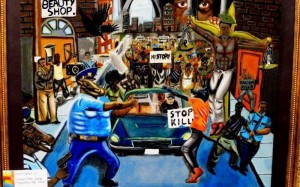 The Comic Book Legal Defense Fund has joined with a diverse group of nonprofits advocating for free expression and the arts in filing an amicus brief with the D.C. Circuit Court of Appeals. The brief is in support of Missouri representative William Clay and David Pulphus, an artist who is Clay’s constituent, appealing the courts decision to support Stephen T. Ayers, in his official capacity as Architect of the Capitol, in removing Pulphus’ contest winning artwork from the wall of the Cannon Tunnel due to political viewpoint pressure.
The Comic Book Legal Defense Fund has joined with a diverse group of nonprofits advocating for free expression and the arts in filing an amicus brief with the D.C. Circuit Court of Appeals. The brief is in support of Missouri representative William Clay and David Pulphus, an artist who is Clay’s constituent, appealing the courts decision to support Stephen T. Ayers, in his official capacity as Architect of the Capitol, in removing Pulphus’ contest winning artwork from the wall of the Cannon Tunnel due to political viewpoint pressure.
On April 14th, 2017, Judge John Bates ruled against Clay and Pulphus,
There is little doubt that the removal of the painting was based on its viewpoint. But for the reasons that follow, plaintiffs’ motion for a preliminary injunction will be denied. Although the Court is sympathetic to plaintiffs given the treatment afforded Pulphus’s art, under controlling authority this case involves government speech, and hence plaintiffs have no First Amendment rights at stake.
The amicus brief filed in support of the appellants argues that the contest is not government speech, but a “limited purpose public forum,” and that Judge Bates ruling of the contest as government speech “was [a] fundamental error, because the government is not ‘speaking’ when it creates and hosts an art competition to showcase the speech of its citizens.” And not reversing this decision could impede artists First Amendment rights all over the country. The brief continues,
The visual arts are omnipresent in public libraries, universities, and government buildings. Particularly in the case of student artists, governments often sponsor or support such displays. If an artist’s individual expression in his or her art ‘could be passed off as government speech by simply affixing a government seal of approval, government could silence or muffle the expression of disfavored viewpoints.’ Matal v. Tam, 137 S. Ct. 1744, 1758 (2017). That is precisely what happened here. Moreover, contests or public displays of art would likely become tantamount to contests to convey messages that curry favor with the government, which is more characteristic of totalitarian regimes than our democracy.
The CBLDF was only one of seventeen different organizations to cosign the brief including Americans for the Arts, Arts & Business Council of Greater Boston, California Lawyers for the Arts, College Art Association of America, The Free Speech Coalition, The Greater Pittsburgh Arts Council, Index on Censorship, Lawyers for the Creative Arts, Maryland Lawyers for the Arts, National Coalition Against Censorship, Oregon Volunteer Lawyers for the Arts, PEN American Center, Springboard for the Arts, St. Louis Volunteer Lawyers and Accountants for the Arts, Volunteer Lawyers for the Arts, and Washington Area Lawyers for the Arts.
You can read PEN America’s press release on the brief here, and the National Coalition Against Censorship’s here.
To see a more in-depth analysis of the original trial, go here.
Oral arguments have not yet been scheduled at the time of this posting.
Help support CBLDF’s important First Amendment work in 2018 by visiting the Rewards Zone, making a donation, or becoming a member of CBLDF!